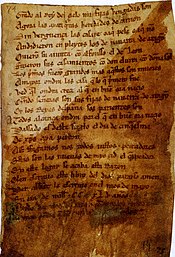
Back Discutiniu pol nome del español o castellán AST Controversia por el nombre del idioma español Spanish Polemica re espaniol e castiliano Interlingua Nama dari bahasa Spanyol ID Polêmica em torno das denominações espanhol e castelhano Portuguese Nume date limbii spaniole Romanian Название испанского языка Russian
This article needs additional citations for verification. (February 2007) |

The Spanish language has two names: español (English: Spanish) and castellano (English: Castilian). Spanish speakers from different countries or backgrounds can show a preference for one term or the other, or use them indiscriminately, but political issues or common usage might lead speakers to prefer one term over the other. This article identifies the differences between those terms, the countries or backgrounds that show a preference for one or the other, and the implications the choice of words might have for a native Spanish speaker.
Formally speaking, the national language of Spain, the official Spanish language, is the Castilian language (as opposed to the regional languages of Spain, such as Galician, Catalan, Asturleonese, and Basque). As such both names, español and castellano, have distinct and independent meanings that may be required for clarity in some specific contexts. Generally speaking, though, both terms can be used to refer to the (national) Spanish language as a whole, with a preference for one over the other that depends on the context or the speaker's origin. Castellano (as well as Castilian in English) has another, more restricted, meaning, relating either to the old Romance language spoken in the Kingdom of Castile in the Middle Ages, predecessor of the modern Spanish language, or to the variety of Spanish nowadays spoken in the historical region of Castile, in central Spain.
